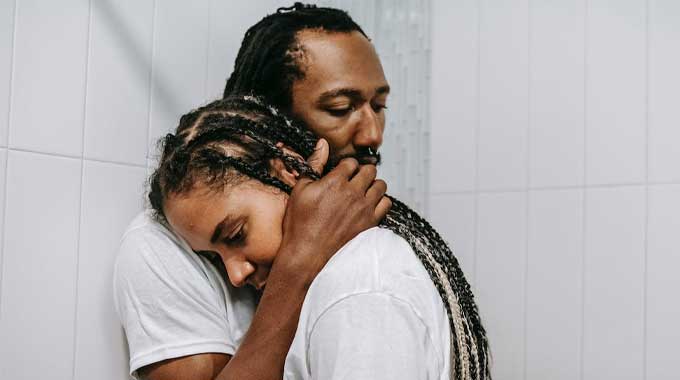Depression can impact the lives of not only the person experiencing it but also those around them. This is especially true when it comes to romantic partners, with mental illness commonly putting a strain on the connection and communication between them. However, understanding more about a loved one's condition and knowing how you help can make a huge difference in a relationship.
What is Depression?
Depression - or major depressive disorder - is a mental health condition that negatively impacts how you think, feel, and act. People with depression experience feelings of sadness and lose interest in activities they used to enjoy. The condition also decreases their ability to carry out tasks at home and work. According to the National Institute of Mental Health, around 21 million adults across the US are living with major depressive disorder - that's over 8% of the population. Although, when the surrounding family members of these individuals are taken into account, it easily impacts millions more.
Everyone experiences sadness at times in their life as a natural part of the human experience, though this is not the same as having depression. It is normal to feel deep and prolonged sadness from the loss of a loved one, the end of a relationship, trauma, or a big disappointment, though these phenomena are different. Distinguishing between the two allows people to seek the help and support that is right for their situation.
To be diagnosed with depression, the individual must display a loss of functioning compared to their previous abilities and their symptoms must last at least two weeks. However, sadness induced by a life event can coexist alongside depression and sometimes be the cause of it.
Symptoms of Depression
When depression symptoms first appear, many do not realize that the mental health condition is to blame. For both the person with depression and their loved ones this can be scary and confusing. If you are unsure if you or your partner is experiencing depression here are some common signs to look out for:
- Feelings of sadness, hopelessness, tearfulness, or emptiness
- Loss of interest or pleasure in activities e.g. hobbies, sex, sports
- Feelings of worthlessness or guilt
- Fixating on past failures or self-blame
- Changes in the sleeping pattern - either sleeping too little or too much
- Tiredness and lack of energy
- Angry outbursts and irritability even over small matters
- Changes in the eating pattern - either reduced or increased eating
- Anxiety, agitation, or restlessness
- Unexplained physical problems e.g. headaches, stomach aches, back pain
- Slowed thinking, speaking, or body movements
- Trouble concentrating and making decisions
- Worsened memory
- Frequent thoughts of death, self-harm, or suicide
It is also important to note that signs of depression can take shape differently between different genders. Men tend to express their mental illness through bouts of aggression or anger. As people commonly associate depression only manifesting as sadness, this causes many men to go undiagnosed. Men may commonly isolate themselves from their loved ones by spending more time at work. They are also more likely to abuse alcohol or other substances to cope.
What Causes Depression?
Understanding the causes of depression can be vital to put into context what you or your loved one is going through. Any person can experience depression, though there are some risk factors that increase their chances of this happening. These include:
- Genetics: certain heritable genes can be passed down between generations that increase the chance of experiencing depression.
- Biochemistry: different levels of neurotransmitters in the brain can alter your risk of developing depression.
- Traumatic and stressful circumstances: experiencing trauma can increase your chances of depression - such as discrimination, death, violence, neglect, or poverty.
- Personality: people who are generally pessimistic, have low self-esteem, and are easily overwhelmed by stress seem to have a higher chance of developing depression.
- Nutritional reasons: the amount of magnesium and vitamin D the body processes has a role in depression. Not having enough could be from a lack of these nutrients in one's diet or due to a biological deficiency.
- Sleep: not getting enough sleep can increase a person's vulnerability to the disorder.
The Brain and Depression
The biological factors and changes that contribute to depression are still not fully understood due to the complexity of both the disorder and the brain. However, there are thousands of researchers across the globe actively seeking these answers to improve our understanding of the condition. This knowledge will allow disease prevention, plus, improve treatment options and outcomes.
What scientists do know is that depression is linked to imbalances of neurotransmitters in the brain, namely; serotonin, norepinephrine, and dopamine. These chemicals are involved in the regulation of many important physiological functions such as sleep, eating, mood, and sexual behavior. They also regulate the reward-seeking and pleasure centers of the brain. When these chemicals are out of balance, the functions follow suit, consequently leading to major depressive disorder.
Can You Have a Healthy Relationship With Someone Who is Depressed?
For people experiencing depression, having a close loved one for support, comfort, and love can be such a big deal for their recovery. The role of the supporting partner can be extremely rewarding, however, it also can also feel like an enormous pressure. People commonly take on their depressed partner's pain, feeling helpless and hurt as they watch someone they love go through a difficult period.
Despite this, it is definitely possible to have a long, fulfilling, and happy relationship with a depressed spouse. Any kind of relationship takes continuous work for it to succeed - particularly romantic ones. Adding depression to the mix simply means working a little harder. The key to all relationships is practicing empathy, understanding, and communication.
Supporting a Loved One with Postpartum Depression
Postpartum depression (PPD) is a serious but treatable condition that affects many women after childbirth, often bringing intense sadness, anxiety, guilt, and disconnection. Unlike the "baby blues," PPD persists and can interfere with daily functioning and bonding with the baby. Some may also experience postpartum anxiety or, in rare cases, postpartum psychosis an emergency condition marked by hallucinations and paranoia requiring immediate medical help. If someone you love is struggling, the most important thing you can do is listen without judgment, offer reassurance, and encourage professional support. Help her access treatment, attend appointments, or connect with support groups. Validate her emotions and avoid minimizing her struggles. Small actions like preparing meals, going for a walk together, or simply showing up can make a big impact. Maintaining your own mental health is also essential when offering support. Effective treatment may include therapy, such as CBT, support groups, and in some cases, medication like SSRIs. With compassion and the right care, recovery is absolutely possible, and new mothers can find joy and confidence in parenthood.
If you're concerned about someone facing PPD, Cornerstone offers supportive, personalized care to guide the healing process—reach out today to learn more.
How Do You Help a Partner Who is Struggling?
Knowing how to approach a depressed spouse is somewhat of a balancing act: treading carefully between opening up and giving them space. To transform frustration into a fulfilling and vibrant partnership, here are a few ways to help both you and your depressed partner.
Suggest Support
The first step in helping your partner living with depression is encouraging them to speak to a mental health professional. Major depressive disorder is a serious mental health condition that usually requires medical assistance to overcome in most cases. This is especially true if the illness is chronic and not a circumstantial episode. For many, a deep routed issue is at the center of their depression, so speaking to a professional allows this to be addressed and overcome.
With so many types of therapy to choose from and so many therapists on offer, finding a therapist can feel overwhelming and scary for someone with depression. Many people fear talking to a therapist, as the issues they've never confronted suddenly need to be. Therefore, it can be extremely helpful to assist your partner in researching options, helping them decide which seems the best, setting up appointments, or driving them to them.
Take Care of Yourself
It's easy to forget about yourself when looking after a spouse, however, you can only care for others as well as you are looking after yourself. It is important to practice self-care to reduce stress levels and make sure your own well-being is maintained. This could include seeing friends, meditating, journaling, taking a bath, or simply spending alone time.
Practice Deep Listening and Communication
Deep listening can be one of the easiest and most crucial ways to help out a depressed spouse. When they talk, try to not interrupt them and listen without assumptions or judgment. It is important to be truly present in the moment without the distractions of your phone or other tasks.
Make eye contact with them, and show with your body language that you are accepting and open. Non-verbal feedback such as nodding is also helpful to show your partner they are being heard. Communicating in this way decreases feelings of loneliness and isolation that commonly accompany depression.
Encourage Social Connections
Many people with depression want to isolate themselves away from others, commonly solely relying on their partner for social interaction. However, socializing and connecting with others is key to overcoming depression. Encouraging your depressed spouse to spend time with other close loved ones who can offer empathy and understanding can do wonders.
Support groups are a great way to socialize. These spaces allow for an open and non-judgemental environment with people who have experienced a similar thing to you. People can find advice and guidance in a support group and often make new friends also.
Encourage Exercise
It's no secret that exercising is vital for neurological health, though your partner's symptoms can mean they have little motivation to do so. Here, you can play a big role by encouraging your partner to get moving by asking them to accompany you on a walk, go to the gym, or try a new sport.
This time together can be extremely helpful in lifting their mood and strengthening the bond between you both. Plus, it creates an opportunity to meet new, like-minded people with similar interests.
Encourage Openness While Respecting Their Boundaries
It can be confusing seeing your partner in pain and not knowing what is going on inside their head. It is normal to want to know and it is healthy to share, but pushing them to open up too hard may only push them away. If your partner is not responsive to a prompt, wait a day or two and bring it up again.
Opening up yourself is a great way to show your relationship is a safe space to do so. However, it is important to remember some people have a harder time expressing their feelings and thoughts, so patience is key here.
Create a Low-Stress Environment
For someone with depression, everyday tasks can bring about a lot of stress and chores often build up. It's important to cut them some slack around the house and do some chores for them if you can. Get rid of dirty places, do laundry, or cook them a meal.
Offer Plenty of Encouragement
People experiencing depression commonly have low-self esteem during this time, with little tasks feeling like a huge challenge. People with depression often shame themselves for not achieving more, feeling bad that it took them so long to get out of bed or go to take a shower.
Instead of being another voice of shame in their life, why not offer an encouraging outlook and celebrate even the things that seem small? This way, you can show your partner you are on their side, increasing their confidence and self-esteem.
Have an Emergency Plan
Depending on the severity of the person's depression, a suicide prevention plan may need to be put in place to protect their life. This could include knowing which number to call in case of an emergency, removing dangerous objects from the household, or learning some basic first aid.
At Cornerstone, we offer a range of rehabilitation programs to support you or your loved one through their mental health issues. Our expert staff approaches our clients with empathy and understanding, using evidence-based, medically reviewed approaches to yield the most successful and effective results.
As each individual has traveled a completely different path in life, we approach our treatment from a highly personalized perspective. We also ensure that each person's recovery is looked at in a holistic manner to address any of the mental and physical health issues they may be experiencing.
Depression can be isolating and confusing, but know you are not alone. Please contact the team at Cornerstones today to find out more about our treatment programs.









